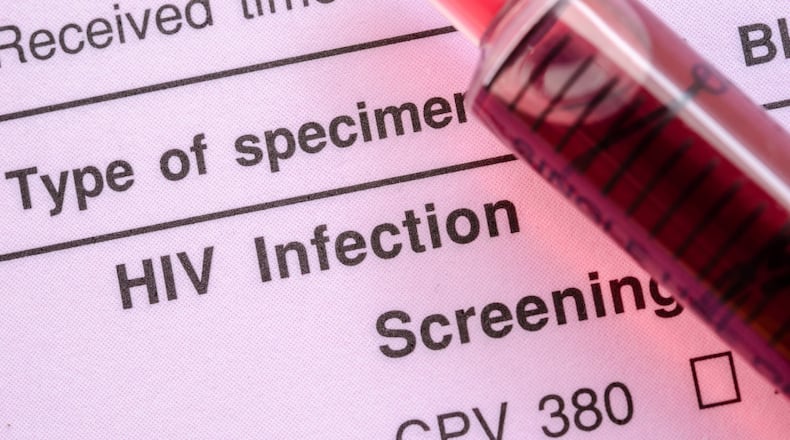More than 70 people with AIDS or HIV may have no hope of stopping their evictions from housing provided by a city of Atlanta-run program, a Legal Aid attorney says. Half are set to lose electricity and gas services Friday.
It's all part of an ugly, tangled dispute between the city — which administers federal grants aimed at preventing homelessness among those with AIDS or HIV — and one of its longtime housing contractors.
The tenants stay in 54 rental units provided by the for-profit company Rebirth Housing.
Rebirth receives its funding from the nonprofit Living Room, which says the city is months late on its payments. That tardiness is threatening housing for another 180 people, the nonprofit and others said.
For its part, the city says Living Room has provided shoddy service and failed to follow rules governing the federally funded Housing Opportunities for Persons with AIDS (HOPWA) program.
While the dispute rages, anxiety-filled tenants can only wait and watch.
“The best case scenario is just to get them out and try to find them somewhere else to go,” said Atlanta Legal Aid attorney Stefanie Sparks, who is part of a special team her office created to deal with the crush of tenants looking for help.
“These clients are surely going to be evicted, and there is not much representation we can provide,” Sparks added.
Many are in fragile health and too ill to work.
Two roommates interviewed say they are scraping together money to keep the lights on and pay the $822 in overdue rent and fees. Each pays one third of her $760 monthly disability income toward rent and the rest is subsidized. They have receipts that prove they paid on time every month, Sparks said.
“I can’t go through this anymore,” the 56-year old client said. She and her 52-year-old roommate have been diagnosed with debilitating anxiety and bipolar disorder in addition to being HIV positive. They worry the turmoil will force them to be hospitalized.
“I can’t go through this, either,” her roommate said. “I’m not starting over. I’m not going without a fight.”
The clients requested that The Atlanta Journal-Constitution withhold their names for fear of discrimination if their illnesses becomes public knowledge.
Living Room Executive Director Jerome Brooks said his nonprofit can’t pay its portion of their subsidized rent because the city is hundreds of thousands of dollars behind on its payments.
City leaders agree that the crisis is a result of long-festering problems at the city's HOPWA program, which administers about $23 million in federal funds to serve clients in 28 counties in and around Atlanta. Service providers said they are frustrated over the city's chronically late payments, poor management and under-staffing. A top official at Georgia Equality, which advocates for the LGBTQ community, said it has lost confidence in the city's ability to manage the crisis.
It’s unclear what plans the city has made to ensure its clients continue to have housing or utilities.
City spokesman Michael Smith did not make Office of Grant Management Director Karen Carter available for an interview or answer questions about the program’s status. Carter oversees the HOPWA program.
A spokesman for the U.S. Department of Housing and Urban Development, which funds HOPWA, did not make Director of the Office of HIV/AIDS Housing Rita Harcrow available for comment or answer questions about what it plans to do to keep clients from becoming homeless. The agency released a statement saying it is working with the city to address the issue.
Federal rules do have provisions that can keep clients from homelessness, said Orlando Cabrera, a former assistant secretary for HUD.
“It would be a terrible thing if the City of Atlanta withheld funding from people who clearly need it, especially people who have HIV and are low income,” said Cabrera, who is now a partner at Arnall Golden Gregory. “HOPWA ultimately benefits low income survivors of HIV and AIDS. It seems to me that, absent extenuating circumstances, it would be a bad public policy decision to be putting people with HIV on the street.”
Rebirth Housing contracts with Living Room and Positive Impact Health Centers, which receive HOPWA dollars from the city.
Rebirth leases its units from landlords across the Atlanta area under its own name as many of these clients have low incomes, poor credit or other problems that keep them from qualifying to rent, said Todd Mitchell, who is head of Rebirth.
Because clients are not named on the leases, they have no standing in court when their landlords file for eviction, Sparks said.
“There really are no legal defenses for clients that aren’t on the lease,” Sparks said.
And because Rebirth provides utilities for about half of them, those clients will lose electricity and gas Friday. Mitchell said he cannot afford to pay for them because the Living Room owes him money. He informed the city, his clients and others of the shutoff well in advance, he said.
Verbal agreements to keep at least some of the city’s clients housed do exist, said Jennifer Hardaway of Serendipity Recovery, which houses HOPWA clients at Collier Heights Apartments. She is arranging with the city and other nonprofits to take on some Living Room clients after the eviction process is complete and hopes to keep a portion of them in the same units. Arrangements have not been formalized.
Many parties made mistakes that have led to the crisis, said Hardaway. “No way is the city to blame for all of this mess,” she said. She thinks the city will be able to keep all of its clients from homelessness, but the process will take time, money and manpower.
Brooks of the Living Room said he is working on delaying utilities shutoffs.
“There’s not a lot we can do,” Brooks said.
About the Author
Keep Reading
The Latest
Featured



